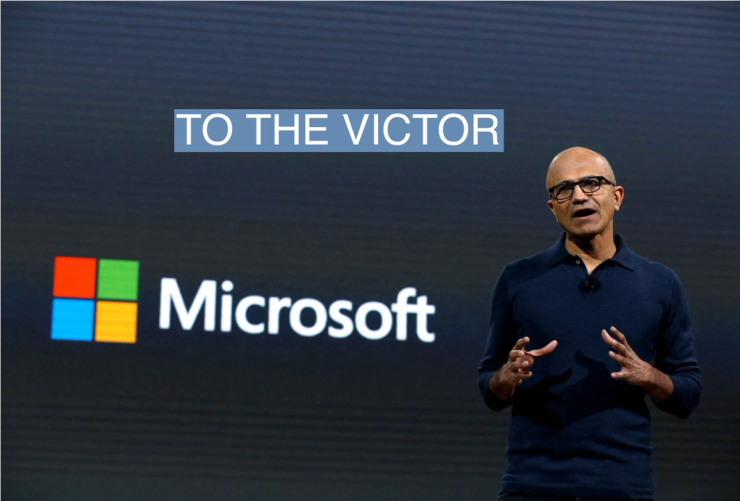The Scene
The Silicon Valley meltdown that left pretty much everyone involved in the hottest startup in the world looking like a bunch of clowns has one clear winner: Microsoft CEO Satya Nadella.
The chief executive, who on Friday was facing a strategic nightmare, now appears to have played a game of corporate chess to perfection over the weekend.
Last week ended with an emergency for Nadella, the 56-year-old Microsoft veteran who took the reins from Steve Ballmer in 2014. Microsoft had made a $10 billion commitment to fund OpenAI and inked an exclusive deal to employ the startup’s models in nearly every Microsoft product, from Bing to Office to GitHub.
But Microsoft gave OpenAI a long leash, and took no formal role in the company’s unusual governance structure, in which a nonprofit board oversaw the for-profit business. When that board was partially vacated over the past year, alarm bells didn’t go off at Microsoft. For a time, it looked like the company’s typically careful corporate culture had been outfoxed by the high-flying ideologues of Silicon Valley.
That impression intensified when then-OpenAI CEO Sam Altman was ousted, and one of the strangest corporate dramas in American history appeared, for a moment, to put Microsoft’s transformative deal in jeopardy. The tech giant seemed to risk being left with a partnership with a diminished OpenAI, and its top talent possibly leaving for a new venture.
Instead, Nadella was able to claim a checkmate by hiring Altman — and pin OpenAI’s rogue board of directors into a tiny corner. By hiring him and OpenAI’s co-founder and former chairman Greg Brockman to run a research team within the company, Microsoft blocked pretty much any move OpenAI could make.
In this article:
Reed’s view
The devil is in the details of Microsoft’s arrangement with OpenAI, which had been seen for a time as too generous to the startup. Microsoft has exclusive rights to use OpenAI’s technology and it knows how that technology works. With Altman and Brockman — and the leading AI researchers who will surely follow them there — Microsoft has both the contractual right to use what OpenAI has built and the talent to invent whatever OpenAI would have come up with next.
OpenAI, on the other hand, is handcuffed to Microsoft. It is contractually barred from taking its technology to one of a small handful of cloud compute companies with the scale to train these models.
OpenAI could theoretically keep developing the technology and just not hand it over to Microsoft. But there’s another wrinkle: According to people familiar with the matter, a large portion of its much-touted $10 billion investment from Microsoft comes in the form of cloud compute credits.
In other words, OpenAI’s funding comes in the form of the right to use MIcrosoft’s infrastructure. The two companies have had to work extremely closely to figure out how to run OpenAI’s models at scale, so this process involves a kind of IP osmosis. Microsoft’s team learns a lot about how OpenAI’s models work in the process of implementing the technology. It’s possible OpenAI could one day sue Microsoft for stealing its IP, but that’s going to be a tough case to win, based on the fact that so much AI technology is open source.
The current meltdown opens the door to a wave of litigation, including claims — relatively common in the industry — that Altman and the departing team at OpenAI are taking trade secrets with them to Microsoft. But Altman doesn’t even own OpenAI shares and California, where OpenAI is headquartered, does not allow the enforcement of noncompete agreements.
And OpenAI has put itself in a difficult position to claim financial damages. The whole point of Altman’s dismissal was that he was commercializing the technology too quickly.
OpenAI will also struggle to find any new investment. The company’s $80 billion valuation was already hard to justify. And it will require billions of dollars of new capital to keep operating.
But the biggest reason investors will steer clear of OpenAI is that the company has decided to act against the interest of all the current financial backers in favor of the company’s nonprofit mission statement: To develop AI for the good of humanity, even if it means hampering the for-profit’s commercial interests.
For all these reasons, OpenAI has nowhere to go. And that’s the real reason it will face a massive employee exodus almost immediately, with a majority likely going to Microsoft, which has offered all of them jobs.
The most likely conclusion to this melodrama is that Microsoft, one of the most valuable companies in the world, just acquired an $80 billion company with the fastest-growing consumer app in history for basically nothing.
As Benchmark’s Bill Gurley tweeted, “If you told me 10 years ago that a group of the smartest engineers in the land would evoke the threat, “Do what I say or I will go to work at Microsoft,” I would not have believed you. Amazing shift in corporate reputation (and much credit to Satya).”
And there’s little OpenAI, or even Federal Trade Commission Chair Lina Khan, can do about it. On Monday, Microsoft’s stock price ticked back up, reversing all of the losses that came after Friday’s announcement. Wall Street was back on Nadella’s side.
The View From AI Doomers
Blowing up OpenAI was, at its core, an attempt to protect humanity from a runaway AI that might one day destroy humanity.
But these so-called “AI Doomers” are not rejoicing. In fact, on an online polling website that is popular with this crowd, people on average gave Altman’s departure from OpenAI a 25% chance of reducing the technology’s risks.
That’s likely because it amounts to just a speed bump on the way to advances in AI.
Notable
- The Information, which broke a lot of news on the OpenAI drama this weekend, reported that some of the startup’s customers are considering moving to rivals like Anthropic, Google, and Cohere.


